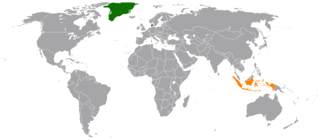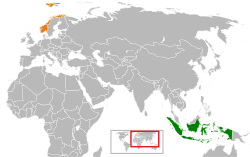Economic relations
The economic relations between Indonesia and Norway are particularly focussed in energy, marine and fishery sectors. The value of bilateral trade reached US$353.79 million in 2010, US$309.52 million in 2011, and US$321.88 million in 2012. [3] Indonesian export to Norway includes clothing, footwear, furniture, communication devices, optical device and spices. While Norwegian exports to Indonesia mainly are Norwegian salmon, that in 2012, Indonesia imported 4,000 tons of them. [3] In Indonesia, Norway has invested various sectors includes fisheries, paper, chemical, and metal industries, construction, trade and repair, transport, storage and communications, and real estate sectors. [6] So far Norway has invested $650 million in Indonesia. [3] As of 2014, there were about 20 Norwegian companies present and operating in Indonesia. [2]

Hungary–Indonesia relations refer to bilateral relations between Hungary and Indonesia. The two countries established diplomatic relations in 1955. A Hungarian embassy was opened in Jakarta in 1957. In line to Hungarian "Eastern Opening" policy, and due to Indonesian political weight and market potentials, Hungary considered Indonesia as one of the most influential states in the ASEAN. While Indonesia sees Hungary as a potential market and a strategic entrance to penetrate the markets of Central Europe and Eastern Europe. Hungary has an embassy in Jakarta, while Indonesia has an embassy in Budapest.

Argentina and Indonesia established diplomatic relations in 1956. Since then, bilateral relations between both countries have become increasingly more strategic. According to Argentine Ambassador to Indonesian Javier A. Sanz de Urquiza, Indonesia has been a "true friend of Argentina" over the Falkland Islands sovereignty dispute. Argentina has an embassy in Jakarta, while Indonesia has an embassy in Buenos Aires. Both countries say they share the same values regarding the international order, and the same aspiration to defend the developing nations' interest in international forum. Both countries are members of Group of 77, the G-20 major economies, the G20 developing nations, and Forum of East Asia-Latin America Cooperation.

Denmark and Indonesia established diplomatic relations on 15 February 1950. Denmark has an embassy in Jakarta, and Indonesia has an embassy in Copenhagen. Bilateral relations are strong, as well as the humanitarian response to the December 2004 Indian Ocean tsunami, which claimed the lives of 45 Danes. In 2015, after focusing on China and South Korea, Denmark is gearing up to enhance its relations with Indonesia, hoping that it will help Denmark to build strong ties with the whole Southeast Asian region.

Indonesia and Vietnam established diplomatic relations in 1955. Indonesia has an embassy in Hanoi and a consulate general in Ho Chi Minh City while Vietnam has an embassy in Jakarta. Both are neighboring nations that have a maritime border which lies on the South China Sea and are members of ASEAN and APEC.

Indonesia and Myanmar established diplomatic relations in 1949. Indonesia has an embassy in Yangon, while Myanmar has an embassy in Jakarta.

Indonesia and South Korea established diplomatic relations in 1973. Both countries share a common vision, values and the will to contribute to the international community as middle powers. Both countries are members of G-20 and APEC. South Korea has an embassy in Jakarta and Indonesia has an embassy in Seoul. According to a 2014 BBC World Service Poll, 48% of Indonesians view South Korea's influence positively, with 27% expressing a negative view. The Chinese Indonesian merchant Chen Yanxiang visited Korea between the 1390s and the 1410s, the first major contact between the two nations.

Indonesia and the United Arab Emirates (UAE) established diplomatic relations in 1976. The diplomatic relations are important because both share the solidarity as Muslim majority countries. Indonesia has an embassy in Abu Dhabi, while the United Arab Emirates has an embassy in Jakarta. Both countries are members of the World Trade Organization (WTO),Non-Aligned Movement and Organisation of Islamic Cooperation (OIC).

Indonesia and Nigeria established diplomatic relations on 5 March 1965. Both countries are members of multilateral organizations such as the Non-Aligned Movement, World Trade Organization (WTO), Organisation of Islamic Cooperation (OIC) and Developing 8 Countries. Indonesia has an embassy in Abuja and Nigeria has an embassy in Jakarta.

Brazil and Indonesia established diplomatic relations in 1953. Both are large tropical countries endowed with rich natural resources, Brazil and Indonesia possess the largest tropical rain forest of the world that contains the world's richest biodiversity, which gave them a vital role in global environment issues, such as ensuring tropical forests protection. Both countries lead the list of Megadiverse countries with Indonesia second only to Brazil.

The nations of Indonesia and Mexico established diplomatic relations in 1953. Both nations view their counterpart as strategic partners in each other's regions; Indonesia in Southeast Asia and Mexico in Latin America. Both nations are mutual members of the Asia-Pacific Economic Cooperation, Forum of East Asia-Latin America Cooperation, Group of 15, G20, MIKTA, United Nations, and the World Trade Organization.

Austria and Indonesia established diplomatic relations on 20 November 1954. Austria recognizes Indonesia as a stable and reliable partner, and both countries enjoy excellent relations. The two nations have agreed to expand relations in business, trade and investment, tourism, culture, environment and green technology. Austria has an embassy in Jakarta and honorary consulates in Yogyakarta, Bandung and Surabaya, while Indonesia has an embassy in Vienna that is also accredited to Slovenia.

Indonesia and Sweden established diplomatic relations on 23 November 1950. In recent years both nations demonstrate growing keenness to improve bilateral relations, as each head of government exchanged visits. Indonesia has an embassy in Stockholm that also accredited to Latvia, while Sweden has an embassy in Jakarta that also accredited to East Timor.

Bosnia and Herzegovina–Indonesia relations refers to the bilateral relations between Bosnia and Herzegovina and Indonesia. Bosnia and Herzegovina has an embassy in Jakarta, while Indonesia has an embassy in Sarajevo. The bilateral relations was initially motivated by humanity and religious solidarity. As a nation with the largest Muslim population, Indonesians were shocked by the ethnic cleansing against Muslim Bosniaks during the Bosnian War, and promptly organized and mobilized help. Indonesian support for Bosnia and Herzegovina ranged from collecting donations, sending peacekeeping forces under United Nations, to building the Istiqlal Mosque in Sarajevo.

Indonesia and Poland established diplomatic relations on 19 September 1955. Indonesia has an embassy in Warsaw, while Poland has an embassy in Jakarta. Other than similar red-and-white flags, Indonesia and Poland share a similar course of history through enduring revolutions, wars for independence and maintaining national unity. Both nations have agreed to expand bilateral relations in trade, culture and education sectors, through programs such as staging art exhibitions to proposing student exchange programs and provide scholarships.

Jordan and Indonesia established diplomatic relations in 1950. Both are Muslim majority countries who, despite the challenges, wish to promote and projects the Islamic values of tolerance, justice and equality. Both nations often share similar stances upon issues in the Middle East, such as the Syrian Civil War and the Israeli–Palestinian conflict. Economy and trade relations are also particularly important, currently Indonesia is Jordan's largest trade partner in ASEAN. Jordan has an embassy in Jakarta, while Indonesia has an embassy in Amman that is also accredited to Palestine. Both countries are members of the Organisation of Islamic Cooperation and the Non-Aligned Movement.

Indonesia–Kuwait relations were officially established on February 28, 1968. The relations focused on economy and trade sectors, especially on energy (oil) and human resources. Kuwait has an embassy in Jakarta, while Indonesia has an embassy in Kuwait City. Both countries are the member of Organisation of Islamic Cooperation and Non-Aligned Movement.

Ecuador–Indonesia relations refer to bilateral relations between Ecuador and Indonesia. Relations were established on 29 April 1980; however, it was not until November 2004 that Ecuador established its embassy in Jakarta, and reciprocating 6 years later on November 11, 2010, that Indonesia finally opened its embassy in Quito. Both countries are the members of Forum of East Asia-Latin America Cooperation and Non-Aligned Movement.

Indonesia–Kazakhstan relations refer to bilateral relations between Indonesia and Kazakhstan. The two countries officially established relations in 1993 and share some similarities; both countries possess abundance of natural resources, have predominantly Muslim populations with significant Christian minorities, ensure harmonious diversity and a commitment to human rights and democracy. Both nations have agreed to increase cooperation in several economic sectors, such as agriculture, industry, pharmaceuticals, petroleum, transportation infrastructure and machinery manufacture. Indonesia has an embassy in Astana, while Kazakhstan has an embassy in Jakarta. Both nations are members of the Asia Cooperation Dialogue, Organisation of Islamic Cooperation and the United Nations.

Indonesia–Liberia relations was officially established in 1965; however, it was not until 2013 that the bilateral relations between Indonesia and Liberia started to intensify, signed with the visits of two respective countries' leaders. Indonesian embassy in Abuja is also accredited to Liberia, while Liberian embassy in New Delhi is also accredited to Indonesia.

Indonesia–Qatar relations were officially established on 10 November 1976. Both countries are Muslim-majority ones, with Indonesia being the largest. Both nations are members of Organization of Islamic Cooperation.























